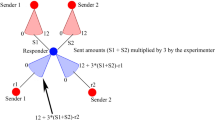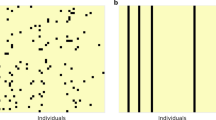Abstract
The present study examined the assumption that non-anonymous choices in social dilemmas (i.e., choices for which one is accountable) may influence cooperation, but only to the extent that decision-makers believe that the others will evaluate non-cooperation negatively. Based on a recent review by Kerr (1999), it was expected that under conditions of accountability, decision-makers would cooperate more when they believed that the others within the group were also concerned about their social reputation and therefore were aware of the social norm of cooperation within social dilemmas. As a consequence, it could be expected that non-cooperation by oneself would be evaluated negatively by those others since they seemed to be aware of what ought to be done in a social dilemma (i.e., the norm of cooperation). Results confirmed these predictions and, in addition, also showed that greater willingness to cooperate was associated with stronger feelings of collective concern. The findings are discussed in terms of recent literature on anonymity effects in social dilemmas.
Similar content being viewed by others
References
Alken, L. S., & West, S. G. (1991). Multiple regression: Testing and interpreting interactions. New York: Sage.
Aquino, K., Steisel, V., & Kay, A. (1992). The effects of resource distribution, voice, and decision framing on the provision of public goods. Journal of Conflict Resolution, 36, 665–687.
Baron, R. M., & Kenny, D.A. (1986). The moderator-mediator distinction in social psychological research: Conceptual, strategic, and statistical considerations. Journal of Personality and Social Psychology, 51, 1173–1182.
Baumeister, R. F. (1982). A self-presentational view of social phenomena. Psychological Bulletin, 91, 3–26.
Baumeister, R. F. (1993). Self-esteem: The puzzle of low self-regard. Hillsdale, NJ: Lawrence Erlbaum.
Baumeister, R. F., & Hutton, D. G. (1987). Self-presentation theory: Self-construction and audience pleading. In B. Mullen, and G. R. Goethals (Eds.), Theories of group behavior. New York: Springer-Verlag.
Cialdini, R. B., Kallgren, C. A., & Reno, R. R. (1991). A focus theory of normative conduct. Advances in Experimental Social Psychology, 24, 201–234.
Dawes, R. M. (1980). Social dilemmas. Annual Review of Psychology, 31, 169–193.
Darley, J., & Latané, B. (1968). Bystander intervention in emergence: Diffusion of responsibility. Journal of Personality and Social Psychology, 8, 377–383.
De Cremer, D., Snyder, M., & Dewitte, S. (2001). The less I trust, the less I contribute (or not?): Effects of trust, accountability and self-monitoring in social dilemmas. European Journal of Social Psychology, 31, 93–107.
De Cremer, D., & Van Dijk, E. (2002). Reactions to group success and failure as a function of group identification: A test of the goal-transformation hypothesis in social dilemmas. Journal of Experimental Social Psychology, 38, 435–442.
De Cremer, D., & Van Vugt, M. (1999). Social identification effects in social dilemmas: A transformation of motives. European Journal of Social Psychology, 29, 871–893.
Gächter, S., & Fehr, E. (1999). Collective action as a social exchange. Journal of Economic Behavior and Organization, 39, 341–369.
Jerdee, T. H., & Rosen, B. (1974). Effects of opportunity to communicate and visibility of individual decisions on behavior in the common interest. Journal of Applied Psychology, 59, 712–716.
Kerr, N. L. (1989). Illusions of efficacy: The effects of group size on perceived efficacy in social dilemmas. Journal of Experimental Social Psychology, 25, 287–313.
Kerr, N. L. (1995). Norms in social dilemmas. In D. Schroeder (Ed.), Social dilemmas: Perspectives on individuals and groups (pp. 31–48). Westport, CT: Praeger.
Kerr, N. L. (1996). “Does my contribution really matter?”: Efficacy in social dilemmas, European Review of Social Psychology, 7, 209–240.
Kerr, N. L. (1999). Anonymity and social control in social dilemmas. In M. Foddy, M. Smithson, S. Schneider, & M. Hogg (Eds.), Resolving social dilemmas (pp. 103–118). Philadelphia: Psychology Press.
Komorita, S. S., & Parks, C. D. (1994). Social dilemmas. Dubuque, IA: Brown & Benchmark.
Lerner, J. S., & Tetlock, P. E. (1999). Accounting for the effects of accountability. Psychological Bulletin, 125, 255–275.
Liebrand, W. B. G. (1984). The effect of social motives, communication and group size on behaviour in a n-person multi-stage mixed-motive game. European Journal of Social Psychology, 14, 239–264.
Luce, R. D., & Raiffa, H. (1957). Games and decisions: Introduction and critical survey. London: John Wiley and Sons.
Milinski, M., Semmann, D., & Krambeck, H-J. (2002). Reputation helps solve the “tragedy of the commons”. Nature, 415, 424–426.
Murnighan, J. K., & Roth, A. E. R. (1983). Expecting continued play in prisoner's dilemma games: A test of several models. Journal of Conflict Resolution, 27, 279–300.
Olson, M. (1965). The logic of collective action. Cambridge, MA: Harvard University Press.
Pillutla, M. M., & Chen, X-P. (1999). Social norms and cooperation in social dilemmas: The effects of context and feedback. Organizational Behavior and Human Decision Processes, 78, 81–103.
Prentice-Dunn, S., & Rogers, R. W. (1982). Effects of public and private self-awareness deindividuation and aggression. Journal of Personality and Social Psychology, 43, 503–513.
Tetlock, P. E. (1985). Accountability: The neglected social context of judgment and choice. In B. M. Staw, and L. L. Cummings (Eds.), Research in organizational behavior. Greenwich, CT: JAI.
Tetlock, P. E. (1992). The impact of accountability on judgment and choice: Toward a social contingency model. Advances in Experimental Social Psychology, 25, 331–376.
Tyler, T. R., & Lind, E. A. (1992). A relational model of authority in groups. In M. Zanna (Ed.), Advances in experimental social psychology (Vol. 25, pp. 115–191). New York: Academic Press.
Author information
Authors and Affiliations
Corresponding author
Additional information
This research was part of the second author's master thesis at Maastricht University. The first author was supported by a fellowship of the Netherlands Organization for Scientific Research (NWO, no. 016.005.019).
Rights and permissions
About this article
Cite this article
De Cremer, D., Barker, M. Accountability and cooperation in social dilemmas: The influence of others’ reputational concerns. Curr Psychol 22, 155–163 (2003). https://doi.org/10.1007/s12144-003-1006-6
Accepted:
Issue Date:
DOI: https://doi.org/10.1007/s12144-003-1006-6




